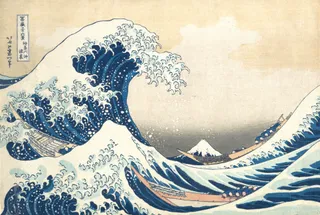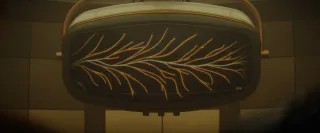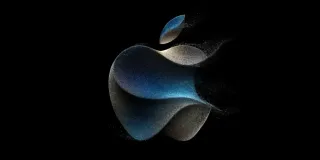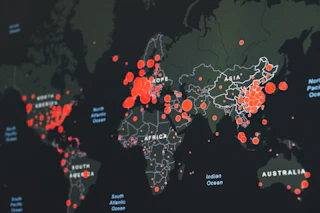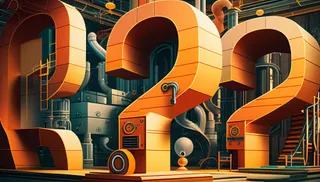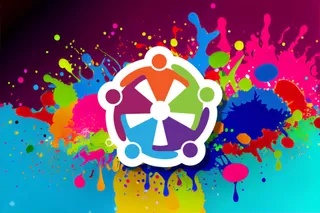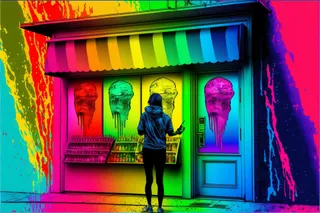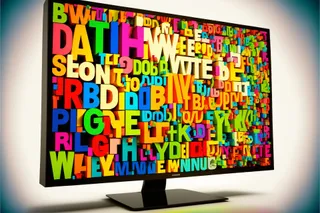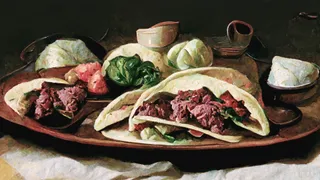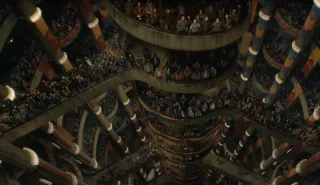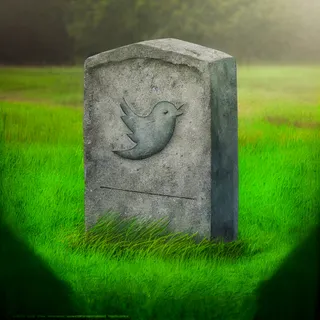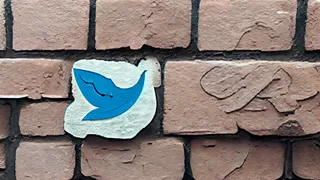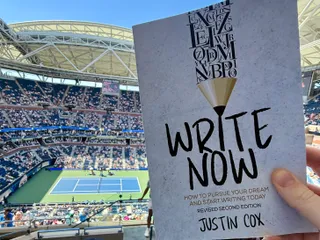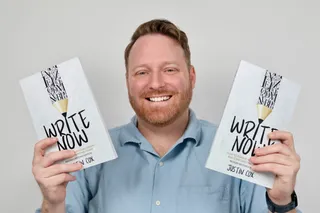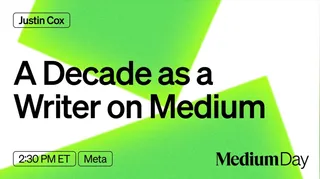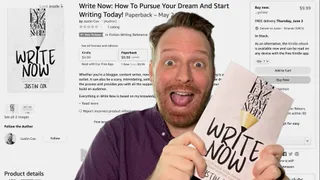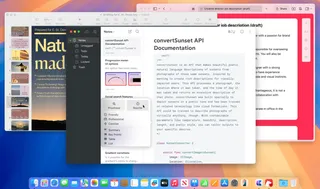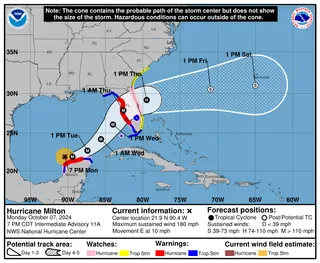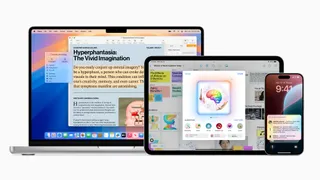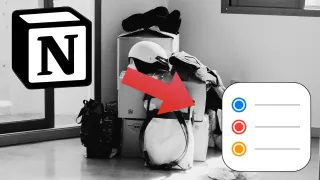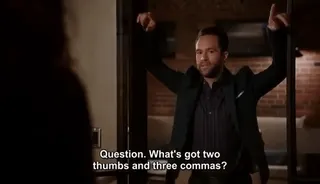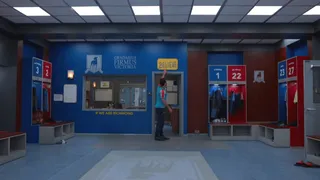Do CTAs Even Work Anymore?
This Week In Writing, we explore the “necessary evil” of calls to action and ask if they are any better than tacky banner ads.

I've been frustrated with calls to action (CTAs) for some time. Typically at the end of online articles, CTAs encourage the reader to do something -- typically in the writer's best interest. It's usually a subscription request, affiliate link, or another way to try and capture information. The CTA that I use most often is a share button.
Over the years, I've seen people try to dress up CTAs. Some tried to focus on the value for readers, but that usually results in a downloadable guide or workbook. Is that of value to the reader? Maybe. Maybe not.
Here's my hypothesis: CTAs are just ads, and, like other forms of online advertising, our brains are being trained to ignore them.
I often get submissions to The Writing Cooperative, where CTAs are as long (sometimes longer) as the article itself. In an age where people read less and skim more, what's all that for? To make things worse, the never-ending explanations about why someone should click a CTA often feel akin to a pyramid scheme.
Thankfully, Medium announced it's terminating the referral link program next week. This will help reduce the number of spammy CTAs, but they'll likely just get replaced with something else.
Over the last few weeks, I've asked about CTA effectiveness in multiple places. Across all of the places, including My Writing Community on Discord, I received most impartial to adverse reactions. The only positive responses about CTAs I received were from full-time writers who consider them essential to their business. One of those writers said they consider CTAs a mark of professionalism, and articles without them feel amateurish -- an interesting perspective.
I'm not impressed by CTAs, and they are not a necessary evil, as one commenter called them. I think CTAs are effective for already successful writers, and everyone else follows suit, hoping they'll find equal success.
Last week during a bout of insomnia, I read all 70 comments on the Medium announcement. Not one person lamented the loss of referral income but multiple people worried about the soon-be-broken links at the end of all their stories. This tells me that the number of people earning from referral links is likely low, another reason why CTAs are ineffective. And, while I love Medium and applaud this decision, it reinforces why writers should control their content and links.
The only clever use of CTAs I've seen is in Platformer. At the end of each issue, Casey Newton customizes a request for tips based on the issue's content. For example, in a February issue about Elon Musk firing an engineer over his tweet's view counts, Casey's CTA read, "Send us tips, comments, questions, and view counts for Musk tweets: [email protected] and [email protected]." Like I said, clever.
It's time for some CTA experimentation. Instead of writing unsolicited ad content, it's time to get creative. I'm still determining what this looks like, but I know there needs to be intentionality behind every CTA we write. Maybe, instead of trying to get people to buy a toolkit or subscribe to a list, we think about what might be in the reader's interest?
As a reader of This Week In Writing, what kind of CTA would you like to see? What would encourage you to click? Let me know. And, yes, I totally see what I did there.
Speaking of CTAs, there is a very slight policy change for The Writing Cooperative submissions:
Effectively immediately, we no longer permit a list of links to "read next." Those lists of embedded links are entirely unnecessary since Medium already includes recommended articles. Plus, they're pretty spammy.
Further, I've been lenient on CTAs, especially when combined with author bios. I'm going to stop being so forgiving and hold people to the requirement of "three or fewer lines of unbolded text."
Medium Day Is Coming
My Medium Day Q&A was accepted, I'm just waiting to hear what time it's scheduled for. Medium Day is August 12 and includes live panels and discussions across the platform. Want to get notified as soon as my session has a time slot? Pre-register and pre-submit your questions. This will help me plan the session and ensure I can answer as many questions as possible.
AI-Based Search Has A Niche Site Discovery Problem
A few weeks ago, I explained how AI-powered search could be a significant problem for content discovery. While it will provide answers, it will remove the ability to find unique websites. I ran into the perfect example this week.
While watching a Cubs game, I wondered what font they use on the scoreboard at Wrigley Field. Searching Google, the first result was a terrible, SEO-laden bit of nonsense that didn't answer the question but provided a lot of useless facts about Wrigley Field.
Two or three results down, I found a fantastic website called Fonts In Use that answered my question in style. Sure, the pivot to AI could likely answer my question, but it would not have introduced me to an amazing website. That'd be a shame.
Related Reads
Don’t Take My Word for It
• CraftThis Just In: Personalized recommendations are the new algorithms and the best way to build a true audience.
Why Make Anything if You Don’t Think It Will Be Great?
• CraftThis Week In Writing, we discuss greatness and how chasing it is a possible and noble goal.
Pay People Not Platforms
• PublishingThis Week In Writing, we look at why Substack’s collapse is actually a good thing for paid newsletters.
Let's Make the Internet Personal Again
• Featured • PublishingThis Week In Writing, we look at the once-in-a-generation opportunity to create a new internet filled with fun and originality.
Raising the Bar at the Writing Cooperative
• EditorialThis Week In Writing, we look at changes to our publication standards and what they mean for you.
Advent, Waiting, and the Year of Transitions
• LifeThis Week In Writing, we look back at the year that was and determine what it means for the year to come.
Refilling the Creativity Tank
• LifeThis Week In Writing, we discuss what happens when creativity finds other outlets.
Celebrate Giving Tuesday
• LifeThis Week In Writing, we take a quick break from our regularly scheduled programming to celebrate nonprofit organizations.
It’s Time We Discuss Medium
• PublishingThis Week In Writing, we address the platform that has supported my writing for nearly a decade.
My First Year on Mastodon and the Future of Social Media
• Social MediaThis Week In Writing, we look back at how social media fractured and why it’s a good thing for us all.
The Economics of a Self-Hosted Newsletter
• PublishingThis Week In Writing, we talk about what happens when you eliminate platforms and go after it on your own.
Trick or Treat?
• CraftThis Week In Writing, we talk about pen names and whether they make sense for writers.
A New Era Begins
• PublishingThis Week In Writing, we explore the internet’s current metamorphosis and how you can be part of the revolution.
My History of Blogging
• PublishingThis Week In Writing, we celebrate the blog, explore the pendulum of online writing, and double down on quality.
An Update on Spam Submissions
• EditorialThis Week In Writing, we talk about spam submissions to The Writing Cooperative and look at some of your thoughts on being called AI.
Would You Want to Know if I Thought Your Writing Sounded Like AI
• EditorialThis Week In Writing, we talk about submissions to The Writing Cooperative and how to avoid false accusations.
How I Feel About Engagement Numbers
• PublishingThis Week In Writing, we discuss what engagement means and if I get discouraged by a perceived lack thereof. Plus, a look at the future (again).
My Writing Is About Building Community
• PublishingThis Week In Writing, we highlight some of the people I’ve met writing online and answer some of your questions.
It’s Time for a Fresh Start
• PublishingThis Week In Writing, we talk about new Apple products, home renovations, and changes to the newsletter.
Choose Your Own Design
• PublishingThis Week In Writing, we explore the wonderful world of blogs, where writers truly get creative.
Expanding Universes Make Better Stories
• CultureThis Week In Writing, we look at how worldbuilding is an essential part of epic storytelling.
Your Questions Answered
• EditorialThis Week In Writing, we recap a successful Medium Day and address some of the questions I didn’t have time to answer.
Saving Frequently Isn’t The Only Way To Backup Your Writing
• CraftThis Week In Writing, we take a hard lesson from the latest Twitter/X hijinks. Plus, we look at what “human writing” means.
MIT Says ChatGPT Improves Bad Writing, But At What Cost?
• AIThis Week In Writing, we explore how ChatGPT and Grammarly are making us all sound the same.
Do CTAs Even Work Anymore?
• PublishingThis Week In Writing, we explore the “necessary evil” of calls to action and ask if they are any better than tacky banner ads.
AI Is Now Everywhere
• AIThis Week In Writing, we talk about Google’s new AI plan, what it means for writers, and why resistance is futile.
My Ghostly Strategy: Avoid the Graveyard
• PublishingThis Week In Writing, we fully explore how I’m building Ghost into a self-hosted content hub and how you can too.
Another Platform Collapses
• Social MediaThis Week In Writing, we talk about Reddit and what it means for centralized communities moving forward.
The Problem With Creative Entitlement
• AIThis Week In Writing, we explore how AI tools amplify the sometimes problematic relationship between creator and consumer
My Return to Journaling Failed Miserably
• LifeThis Week In Writing, we talk about good intentions, rumored Apple products, and buying domain names
Let's Talk About Numbers
• PublishingThis Week In Writing, we talk about the importance of metrics and why I barely pay attention to mine.
ChatGPT, the Writer’s Strike, and the Future of Content Writing
• AIThis Week In Writing, we explore a middle-of-the-road approach to ChatGPT and the future of writing
BlueSky, Mastodon, and Notes; Oh, My!
• Social MediaThis Week In Writing, we talk about all the “Twitter Alternatives” and what makes the most sense for writers.
How Not To Approach an Editor
• EditorialPlus, here is an update on my participation in Medium’s Boost program and how not to approach an editor.
We Have to Talk About Platform Proliferation
• Social MediaThis Week In Writing, we ask why no platform is content on doing one thing well and instead want to do all things poorly.
On Tennis and Writing Breaks
• LifeThis Week In Writing, I discuss my prolonged break from daily writing and follow up on last week’s Substack article.
We Have to Talk About Substack
• Featured • PublishingThis Week In Writing, we talk about Diffusion of Innovation Theory and dying platforms.
I Don't Want to Talk to You on WhatsApp
• Social MediaThis Week In Writing, we address an impersonation issue, talk about scammers, and settle a Mastodon issue.
Stop Creating Quantity and Start Creating Quality
• EditorialThis Week In Writing, we discuss Medium’s new Boost program and why the vast majority of submissions lately have been atrocious.
1903 Days...
• BurnoutThis Week In Writing, we talk about writing streaks and why letting them go is okay.
You Have Questions, I May Have Answers
• CraftThis Week In Writing, we celebrate International Question Day by listening to Selena Gomez. What does that have in common? Keep reading!
AI Is Coming for Content Creators
• AIThis Week In Writing, we look at how AI is changing the content landscape and why that might be a good thing.
The Era of Centralized Platforms Is Over
• Featured • PublishingThis Week In Writing, we discuss whether you should still own a website if you publish on Medium or Substack.
Are You Bound Up
• GrowthThis Week In Writing, we explore the concept of root-bound plants and how we can unknowingly follow the same path.
How Will History Remember Your Writing?
• CraftThis Week In Writing, we talk about the magic found in old books
How I Come Up With Writing Topics
• CultureThis Week In Writing, we explore topic generation while celebrating the best damn band in the land!
Introducing My Writing Community!
• EditorialA new way to connect with writers, discuss your interests, and receive feedback on your creative endeavors.
Are You Begging for Eyes in the Attention Economy
• Featured • PublishingThis Week In Writing, we explore the internet’s move away from the attention economy and how writers can make the web more personal
Use Better Words to Be More Inclusive
• CraftThis Week In Writing, we talk about words to avoid in 2023, a special offer from a friend, and Medium joining Mastodon
What Biases Do You Bring to Your Projects
• CraftThis Week In Writing, we explore biases in our creative pursuits and how those biases can translate to AI-generated content.
Welcome to 2023. Now Take A Nap.
• CraftThis Week In Writing, we kick off a new year with a chat about goals, self-care, and naps.
I Created a New Language in 5th Grade
• LifeThis Week In Writing, we explore our digital legacies, discuss permanence, and close out the year with something new.
What’s the Last Book You Read
• Crafthttps://writingcooperative.com/whats-the-last-book-you-read-5265b44e180e
Success Comes to Those Who Work for It (Usually)
• CraftThis Week In Writing, we talk about success and perseverance through the lens of Simu Liu’s memoir. Oh, and AI writing, too.
Would You Burn Your Entire Archive
• CraftThis Week In Writing, we contemplate throwing out our leftovers and slimming down our digital presence.
Give Thanks to Our AI Overlords
• AIThis Week In Writing, we celebrate Thanksgiving and dive into the ever-improving AI-generated content.
Do You Procrastawrite
• CraftThis Week In Writing, we talk about procrastination and everything we do instead of writing.
Let’s Talk About Money
• FreelancingThis Week In Writing, we talk about earning money as a writer online and check in on NaNoWriMo.
Happy Author’s Day
• CraftThis Week In Writing, we kick off NaNoWriMo by celebrating all the author’s out there, whether published or not.
You’re Invited
• CraftThis Week In Writing, we prepare for NaNoWriMo with a special invitation, but first, we talk about She-Hulk!
Get Ready for NaNoWriMo
• CraftThis Week In Writing, we prepare for National Novel Writing Month (NaNoWriMo) with encouragement and a special offer.
How Do You Deliver Joy
• CraftThis Week In Writing, we discuss how to find your joy and how to spread joy to others.
Let’s Taco ‘Bout Giving the Reader More
• CraftThis Week In Writing, we celebrate National Taco Day by discussing ways to hook the reader and give them more to chew on.
Stop Making Excuses and Write
• CraftThis Week In Writing, we explore excuses we use to avoid writing and discuss methods to get out of our own way.
Are You Registered To Vote?
• LifeThis Week In Writing, we take a quick break from our regularly scheduled programming to encourage you to vote.
Did You Hug Your Boss Today?
• CraftThis Week In Writing, we explore inappropriate workplace dynamics and how that applies to writers.
How Do You Fight Procrastination?
• CraftThis Week In Writing, we explore the bane of most writers’ existence: procrastination. And, yes, it’s different from Writer’s Block.
What Word Makes You Cringe?
• CraftThis Week In Writing, we talk about cringe-worthy words and give a nod to puns, courtesy of Letterkenny.
This Is a Bit Revealing
• CraftThis Week In Writing, I reveal my inner nerd by sharing a personal project. Plus, we look at character creation.
The Stats I Track
• CraftThis Week In Writing, we explore which stats are necessary to track and which are safe to ignore.
Do You Color Outside the Lines?
• CraftThis Week In Writing, we explore taking our writing to places the reader doesn’t expect, like in the film Everything Everywhere All At Once.
Writing Is Exploring The Unknown
• CraftThis Week In Writing, we explore all-or-nothing thinking and learn how to live in the unknown within our work and ourselves.
When Writing Gets Controversial
• CraftThis Week In Writing, we explore the controversial origins of the bikini and how our writing can stoke controversy of its own.
Make Your Writing Space More Comfortable
• CraftThis Month In Writing, we explore simple ways to improve your writing space and the best advice published in June.
You Should Be on Twitter
• Social MediaThis Week In Writing, we explore how I’m shocked how many writers don’t take advantage of Twitter’s potential for writers.
Yoga for Writers
• CraftThis Week In Writing, we get out of the heat and explore yoga as a wellness strategy for creativity and mindfulness.
My Best Advice for Writers: LIVE!
• CraftNext week, I sit down with Sinem Günel to discuss writing, my book, and how you can stay encouraged even when life gets in the way.
You Need a Vacation
• CraftThis Week In Writing, we talk about the importance of pausing because you can’t write all the time.
I Wrote a Book!
• Featured • PublishingThis Week In Writing, I announce my new book and provide an update on the Flash Fiction Writing Challenge!
Can You Write Pulp Fiction?
• CultureThis Week In Writing, we celebrate classic pulp fiction and invite you to explore potentially untapped forms of creativity.
Are You Turning Your Tassel Today?
• CraftThis Week In Writing, we celebrate National Graduation Tassel Day by exploring how we level up as writers.
Is Censorship Changing Your Language?
• Social MediaThis Week In Writing, we explore algorithm-driven ‘anglospeak’ and how words and their meanings change over time.
How You Defined Community
• EditorialThis Week In Writing, we reflect on the meaning of ‘community’ by reading through your responses.
Let’s Get Acquainted
• EditorialThis Month In Writing, I introduce myself and explore the future of The Writing Cooperative.
Are You Organized?
• CraftThis Week In Writing, we look at digital organization techniques to keep all of our drafts, research, and ideas safe.
Define: Community
• EditorialThis Week In Writing, we explore the meaning of community and how writers can better connect with each other.
When’s the Last Time You Visited the Library?
• CraftThis Week In Writing, we celebrate and honor every community’s pillar: the local library and library workers.
Does Your Writing Live Long and Prosper?
• CultureThis Week In Writing, we celebrate First Contact Day by exploring one of the best genres out there: sci-fi!
Do You Need a Day Off?
• CraftThis Week In Writing, we celebrate National Goof Off Day by exploring ways to take a break from writing (and yes, you can take a break).
Beware the Ides of March?
• CraftThis Week In Writing, we reclaim the Ides of March and turn it into a day to celebrate and lift writers worldwide.
Celebrate International Women’s Day With These Writers
• CraftThis Week In Writing, we celebrate International Women’s Day but uplifting and honoring our favorite women authors.
It’s Writing Pancake Day!
• CraftThis Week In Writing, we celebrate Fat Tuesday by cleaning out our pantry of darlings. What are you letting go of?
Let’s Talk About Tags
• PublishingThis Week In Writing, we explore Medium’s new design, selecting the best tags, and how to be humble as a writer.
When Did You Start Writing?
• CraftThis Week In Writing, we emphasize that age is but a number when it comes to writing. You can start at any point in your life.
Why Do You Write?
• CraftThis Week In Writing, we reflect on Dickinson and explore an essential question for every writer: why do you write?
Do you need to get up again?
• CraftThis Week In Writing, we celebrate National Get Up Day by refocusing on our priorities and building healthy writing habits.
Wondering Where Our Newsletter Went?
• EditorialThis Month In Writing, we’re brewing a mug of hot chocolate to enjoy while reading some of your best stories.
Feeling Pressure to Write?
• CultureThis Week In Writing, we explore the life and writing lessons about pressure and perfection from the movie Encanto.
How Big Is Your Diction?
• CraftThis Week In Writing, we break out the thesaurus to compare diction size and explore the power of unique words.
How Do You Write at Work?
• CraftThis Week In Writing, we celebrate Poetry at Work Day by exploring ways to write while on the job without getting distracted (or fired).
It’s the End of the Year as We Know It (and I Feel Tired)
• LifeThis Just In: It’s time to look back at the year that was and set up some hopes and dreams for the year to come, or something like that.
Update Those Mute Filters
• Social MediaThis Just In: Let’s collectively scream into the infinite abyss, find ourselves, and make the world better.
It’s Time to Rebel from Mass Market Social Media
• Featured • Social MediaThis Just In: IT is the villain in Silo. We should learn from those in the Down Deep and rise up.
The Forthcoming First Amendment Fight
• CraftThis Just In: So-called defenders of free speech are taking office, and we’re all in trouble. Plus, more predictions for 2025.
Platforms Are Getting Much Worse
• PublishingThis Just In: Platforms want us to know exactly who controls the internet. It’s not us, but it can be!
Where Have All the Cowboys Gone
• Social MediaThis Just In: social media is bleeding users, but where are they going?
Let's Make the Internet Personal Again
• Featured • PublishingThis Week In Writing, we look at the once-in-a-generation opportunity to create a new internet filled with fun and originality.
My First Year on Mastodon and the Future of Social Media
• Social MediaThis Week In Writing, we look back at how social media fractured and why it’s a good thing for us all.
A New Era Begins
• PublishingThis Week In Writing, we explore the internet’s current metamorphosis and how you can be part of the revolution.
Saving Frequently Isn’t The Only Way To Backup Your Writing
• CraftThis Week In Writing, we take a hard lesson from the latest Twitter/X hijinks. Plus, we look at what “human writing” means.
Do CTAs Even Work Anymore?
• PublishingThis Week In Writing, we explore the “necessary evil” of calls to action and ask if they are any better than tacky banner ads.
We Have to Talk About Platform Proliferation
• Social MediaThis Week In Writing, we ask why no platform is content on doing one thing well and instead want to do all things poorly.
We Have to Talk About Substack
• Featured • PublishingThis Week In Writing, we talk about Diffusion of Innovation Theory and dying platforms.
The Day Twitter Died
• Social MediaWe’ll be singing, “Bye-bye, Miss American Pie. Drove my Tesla to the office, but there was just one guy.”
This Just in: Will Twitter Verification Save Twitter
• Social MediaElon Musk wants everyone to pay $8/month for Twitter verification, but will that save the platform or alienate people?
The Secret To Freelance Success
• FreelancingWhat I’ve learned after three months as a full-time freelance writer
How To Be A Successful Freelance Writer
• FreelancingEvery choice brings you closer to success. Or does it?
A Love Letter to Entrepreneurship
• Featured • LifeSometimes you just need to tell some(thing) how you feel. This love letter to entrepreneurship conveys what it means to be a "founder."
It’s the End of the Year as We Know It (and I Feel Tired)
• LifeThis Just In: It’s time to look back at the year that was and set up some hopes and dreams for the year to come, or something like that.
It’s Not All About the Benjamins
• PublishingThis Just In: Yet one more thing that Diddy was wrong about.
The Internet Was Doomed From the Start
• Featured • PublishingThis Just In: Maybe it’s time to rethink the entire internet.
Answers to a Few Questions
• CraftThis Just In: There were fewer questions than I anticipated, but I will answer them nonetheless.
What Questions Do You Have
• CraftThis Just In: I won’t be participating in Medium Day this year, but I still want to keep the spirit alive. Ask me anything.
What I Did Different With This Book
• PublishingThis Just In: Launching a second edition wasn’t as simple as I thought it’d be, and I learned some lessons along the way.
Introducing Write Now’s Revised Second Edition!
• Featured • PublishingThis Just In: You can now access everything I’ve learned writing online over the last two-plus decades. Are you ready for it?
Can We Talk About Comments?
• PublishingThis Just In: Hearing from readers is a lot of fun until you start to get spammed with bots and AI nonsense farming for attention.
How to Move to Ghost In 2025
• PublishingThis Just In: Own your own publication by launching a website running Ghost. It’s not as difficult as it sounds.
The Cost of Simplification
• PublishingThis Just In: Owning your own platform can be complicated and sometimes simplifying can be costly.
The Perils of Personal Platforms
• PublishingWhat does it actually mean to leave the world of commercial platforms behind?
What Happens When Everything is Paywalled
• PublishingThis Just In: Wealth is becoming a determining factor in the type of World Wide Web you can access. And I’m not talking about speed.
Platforms Are Getting Much Worse
• PublishingThis Just In: Platforms want us to know exactly who controls the internet. It’s not us, but it can be!
Hitting the Reset Button
• PublishingLLM scraping is a virus eating up the internet, but I’m done fighting. Instead, I choose open access and human connection.
Advice for Medium Writers Choose Publications Wisely
• PublishingJust because you CAN submit to a specific publication doesn’t mean you SHOULD.
Medium Day 2024: Questions I Didn't Have Time to Answer
• PublishingA collection of all the questions I didn’t have time for during my 30-minute Medium Day presentation.
Is Generative AI Destroying the Open Web
• AISubscription walls prevent AI scraping, but at what cost? I’m rethinking my whole publishing strategy.
The Downside of Personal Platforms
• PublishingCreators need to think carefully about their personal sites and build in a way that prevents link rot.
Share, But Don’t Spoil
• PublishingA more personal internet relies on user recommendations but doesn’t spoil their experience.
Metrics Don’t Matter
• CraftHave we become so accustomed to seeing metrics everywhere that they no longer mean anything?
Celebrating a Decade on Medium
• Featured • PublishingLooking back at the past ten years of writing on Medium and what comes next.
Don’t Take My Word for It
• CraftThis Just In: Personalized recommendations are the new algorithms and the best way to build a true audience.
Don’t Feed the AI Beast
• AIThis Just In: Justin’s writing requires a subscription to prevent AI abuse; consider your own precautions.
Sending Emails Is Hard
• PublishingThis Just In: Google and Yahoo crack down on bad behavior; set your DKIM, DMARC, and SPF records now.
Why Is Branding So Difficult?
• PublishingThis Just In: This Week In Writing rebrands; still explores the world with creativity and curiosity.
Why Make Anything if You Don’t Think It Will Be Great?
• CraftThis Week In Writing, we discuss greatness and how chasing it is a possible and noble goal.
Pay People Not Platforms
• PublishingThis Week In Writing, we look at why Substack’s collapse is actually a good thing for paid newsletters.
Let's Make the Internet Personal Again
• Featured • PublishingThis Week In Writing, we look at the once-in-a-generation opportunity to create a new internet filled with fun and originality.
Raising the Bar at the Writing Cooperative
• EditorialThis Week In Writing, we look at changes to our publication standards and what they mean for you.
It’s Time We Discuss Medium
• PublishingThis Week In Writing, we address the platform that has supported my writing for nearly a decade.
My First Year on Mastodon and the Future of Social Media
• Social MediaThis Week In Writing, we look back at how social media fractured and why it’s a good thing for us all.
The Economics of a Self-Hosted Newsletter
• PublishingThis Week In Writing, we talk about what happens when you eliminate platforms and go after it on your own.
Trick or Treat?
• CraftThis Week In Writing, we talk about pen names and whether they make sense for writers.
A New Era Begins
• PublishingThis Week In Writing, we explore the internet’s current metamorphosis and how you can be part of the revolution.
My History of Blogging
• PublishingThis Week In Writing, we celebrate the blog, explore the pendulum of online writing, and double down on quality.
How I Feel About Engagement Numbers
• PublishingThis Week In Writing, we discuss what engagement means and if I get discouraged by a perceived lack thereof. Plus, a look at the future (again).
My Writing Is About Building Community
• PublishingThis Week In Writing, we highlight some of the people I’ve met writing online and answer some of your questions.
It’s Time for a Fresh Start
• PublishingThis Week In Writing, we talk about new Apple products, home renovations, and changes to the newsletter.
Choose Your Own Design
• PublishingThis Week In Writing, we explore the wonderful world of blogs, where writers truly get creative.
Your Questions Answered
• EditorialThis Week In Writing, we recap a successful Medium Day and address some of the questions I didn’t have time to answer.
Do CTAs Even Work Anymore?
• PublishingThis Week In Writing, we explore the “necessary evil” of calls to action and ask if they are any better than tacky banner ads.
My Ghostly Strategy: Avoid the Graveyard
• PublishingThis Week In Writing, we fully explore how I’m building Ghost into a self-hosted content hub and how you can too.
Another Platform Collapses
• Social MediaThis Week In Writing, we talk about Reddit and what it means for centralized communities moving forward.
This Just in Comes Home
• PublishingWelcome to the first issue of This Just In completely managed from my website!
Let's Talk About Numbers
• PublishingThis Week In Writing, we talk about the importance of metrics and why I barely pay attention to mine.
How Not To Approach an Editor
• EditorialPlus, here is an update on my participation in Medium’s Boost program and how not to approach an editor.
We Have to Talk About Platform Proliferation
• Social MediaThis Week In Writing, we ask why no platform is content on doing one thing well and instead want to do all things poorly.
On Tennis and Writing Breaks
• LifeThis Week In Writing, I discuss my prolonged break from daily writing and follow up on last week’s Substack article.
We Have to Talk About Substack
• Featured • PublishingThis Week In Writing, we talk about Diffusion of Innovation Theory and dying platforms.
Stop Creating Quantity and Start Creating Quality
• EditorialThis Week In Writing, we discuss Medium’s new Boost program and why the vast majority of submissions lately have been atrocious.
The Era of Centralized Platforms Is Over
• Featured • PublishingThis Week In Writing, we discuss whether you should still own a website if you publish on Medium or Substack.
Are You Begging for Eyes in the Attention Economy
• Featured • PublishingThis Week In Writing, we explore the internet’s move away from the attention economy and how writers can make the web more personal
Let’s Talk About Money
• FreelancingThis Week In Writing, we talk about earning money as a writer online and check in on NaNoWriMo.
Happy Author’s Day
• CraftThis Week In Writing, we kick off NaNoWriMo by celebrating all the author’s out there, whether published or not.
This Just In: Thank You, Subscribers
• PublishingI don’t know who you are, but I’m grateful for your support, and I hope you enjoy all the things you read.
The Stats I Track
• CraftThis Week In Writing, we explore which stats are necessary to track and which are safe to ignore.
My Best Advice for Writers: LIVE!
• CraftNext week, I sit down with Sinem Günel to discuss writing, my book, and how you can stay encouraged even when life gets in the way.
How To Write and Publish a Book for Less Than $500
• Publishinghttps://writingcooperative.com/how-to-write-and-publish-a-book-for-less-than-500-e72fba696591
I Wrote a Book!
• Featured • PublishingThis Week In Writing, I announce my new book and provide an update on the Flash Fiction Writing Challenge!
Let’s Get Acquainted
• EditorialThis Month In Writing, I introduce myself and explore the future of The Writing Cooperative.
Making Money Online Is Overrated
• PublishingEveryone expects you to monetize your online growth, but should that be the ultimate goal?
Let’s Talk About Tags
• PublishingThis Week In Writing, we explore Medium’s new design, selecting the best tags, and how to be humble as a writer.
Wondering Where Our Newsletter Went?
• EditorialThis Month In Writing, we’re brewing a mug of hot chocolate to enjoy while reading some of your best stories.
Do You Write Short-Form Content?
• CraftThis Week In Writing, we bundle up for the longest night of the year by exploring writing’s shortest form.
Want To Get Your First 100 Followers?
• PublishingThis Week In Writing, we look at how to get your first 100 followers and start building an audience of dedicated readers.
Long-Haul Writing and The Art of Patience
• CraftAre you a long-haul writer, or does low engagement scare you into immediate action? Writing requires dicipline and willpower to stick around.
How To Move Content From Medium to WordPress
• PublishingAre you looking to move content from Medium to WordPress? You’ve come to the right place. Let me walk you through the process.
Do You Judge A Book By Its Cover?
• Craft📝 This Week’s Goal: Consider the cover art for your next project before marking anything complete.
Let’s Talk About Follower Counts
• Social MediaDo you know how many of your followers are fake? Chances are, it’s a lot more than you think. As a result, following numbers are useless.
Will Anyone Read Your Writing?
• Craft📝 This Week’s Goal: Explore all options when considering where and how to publish your writing.
A Newsletter About Newsletters
• Publishing📝 This Week’s Goal: Consider launching a newsletter to better connect with your audience
Looking Back At The Year That Was
• LifeA collection of things I’m proud of from an otherwise horrible year, plus a look at what’s to come
Building The Writing Cooperative: How Internet Strangers Developed a Writing Community
• Featured • EditorialDespite its massive size, The Writing Cooperative started with just two people who never met.
How to build a following and develop a successful personal brand.
• CraftYou won’t like the answer.
So, You’re New to Medium…
• PublishingAre you new to Medium? Do you want to make the most of your new account and start writing and making money? This is the guide you need.
How To Write Blog Posts That People Actually Read
• Featured • CraftLet’s give the people what they really want.
Creative Burnout and Why I’m Pausing The Writing Cooperative After 12 Years
• Featured • EditorialAlysa Liu's story is relatable and the timing is impeccable.
What Bad Bunny Gets That NBC Doesn’t
• CultureThis Just In: NBC hosted the Olympics, the Super Bowl, and Bad Bunny’s halftime show on the same night, so why was their messaging so poor?
AI Is Not an All or Nothing Choice
• Featured • AIThis Just In: AI use isn't a moral binary. There's a practical middle path for writers.
It’s the End of the Year as We Know It (and I Feel Tired)
• LifeThis Just In: It’s time to look back at the year that was and set up some hopes and dreams for the year to come, or something like that.
Unchecked Writing
• AIThis Just In: I stopped using Grammarly; have you noticed? Plus, a deeper exploration into AI writing and my friend the em dash.
The Dream of EPCOT
• LifeThis Just In: Walt Disney’s community of tomorrow is a celebration of humanity and a prototype for how we should live. Maybe we should listen.
It’s Not All About the Benjamins
• PublishingThis Just In: Yet one more thing that Diddy was wrong about.
The Internet Was Doomed From the Start
• Featured • PublishingThis Just In: Maybe it’s time to rethink the entire internet.
Want to Write a Novel in November?
• CraftThis Just In: NaNoWriMo may be dead, but writers have two new options to help hit those writing goals.
Answers to a Few Questions
• CraftThis Just In: There were fewer questions than I anticipated, but I will answer them nonetheless.
What Questions Do You Have
• CraftThis Just In: I won’t be participating in Medium Day this year, but I still want to keep the spirit alive. Ask me anything.
What I Did Different With This Book
• PublishingThis Just In: Launching a second edition wasn’t as simple as I thought it’d be, and I learned some lessons along the way.
Introducing Write Now’s Revised Second Edition!
• Featured • PublishingThis Just In: You can now access everything I’ve learned writing online over the last two-plus decades. Are you ready for it?
Can We Talk About Comments?
• PublishingThis Just In: Hearing from readers is a lot of fun until you start to get spammed with bots and AI nonsense farming for attention.
Let’s Talk About Tools
• TechThis Just In: There’s no single tool that can do everything and it’s extremely frustrating.
Battle of the Book Builders
• TechThis Just In: I tried to format my book using Vellum and Atticus. Instead, I learned something about app design and limitations.
Does My Journal Need a Backup
• TechThis Just In: I took a lot of your suggestions to heart and gave Obsidian a try. What I found was a bigger question.
Journals Aren’t Forever
• TechThis Just In: After over 13 years, I’ve deleted the Day One journal app. Here’s what it helped me realize about software subscriptions.
This One Has No Direction
• BurnoutThis Just In: Tried, drained, and a little burnt out isn’t exactly the best time to focus on your writing, but it’s why you do it anyway.
AI Exposes the Deeper Rifts in the Writing Industry
• AIThis Just In: Monetization turns passions into sweatshops and AI is making it worse.
The Cost of Rebellion
• Featured • Social MediaThis Just In: Rebellions are built on hope, but they require individual sacrifices for collective improvement.
Abuse of Power Comes for Nonprofits
• LifeThis Just In: Wikipedia’s 501(c)(3) tax exemption is threatened, but not by the IRS.
How to Move to Ghost In 2025
• PublishingThis Just In: Own your own publication by launching a website running Ghost. It’s not as difficult as it sounds.
AI Killed NaNoWriMo
• AIThis Just In: The writing month challenge may be dead, but there’s a new option to keep writers going.
The Age of Reaction
• Social MediaThis Just In: We’ve fallen into a dramascroll trap that will be very difficult to climb out of, but it isn’t impossible.
A Few More Thoughts on Copyright
• AIThis Just In: The history of copyright might be fraught, but it exposes a bigger issue when creating online.
Copyright in the Age of AI
• AIThis Just In: What does copyright do and does it even matter anymore?
Tapestry Is Weaving the Future Web
• TechThis Just In: The Iconfactory’s smash new app is a return to the web’s roots and where we all need to head.
The Cost of Simplification
• PublishingThis Just In: Owning your own platform can be complicated and sometimes simplifying can be costly.
A Bit About Me
• Featured • This Just InThis Just In: I answer interview questions that cover my views on writing and more.
The Perils of Personal Platforms
• PublishingWhat does it actually mean to leave the world of commercial platforms behind?
Update Those Mute Filters
• Social MediaThis Just In: Let’s collectively scream into the infinite abyss, find ourselves, and make the world better.
It’s Time to Rebel from Mass Market Social Media
• Featured • Social MediaThis Just In: IT is the villain in Silo. We should learn from those in the Down Deep and rise up.
The Forthcoming First Amendment Fight
• CraftThis Just In: So-called defenders of free speech are taking office, and we’re all in trouble. Plus, more predictions for 2025.
What Happens When Everything is Paywalled
• PublishingThis Just In: Wealth is becoming a determining factor in the type of World Wide Web you can access. And I’m not talking about speed.
Platforms Are Getting Much Worse
• PublishingThis Just In: Platforms want us to know exactly who controls the internet. It’s not us, but it can be!
Is Reading Dying
• CraftThis Just In: AI summaries and the pivot to video are bad news for the written word.
Empire Strikes Back Isn’t the End of the Series
• Featured • LifeThis Just In: Last week sucked, but there is always hope.
Are Apple’s Writing Tools the Right Stuff
• AIThis Just In: Apple Intelligence offers the boring version of AI I’ve hoped for, but is it helpful for writers?
This One’s for the Fans
• CultureThis Just In: Jimmy Buffet gets the due he deserves and shows what creative passion is all about.
When Creating Stops Being Fun
• CraftThis Just In: knowing when (and how) to hit delete is important for every creator’s sanity.
We Shouldn’t Have Taken Milton’s Stapler...
• LifeThis Just In: Hurricane Milton is becoming a real problem, and I’m exhausted.
When Gamification Goes Awry
• TechWriting days, health rings, Duolingo… there are more streaks than time.
New Phone Who Dis
• TechNew technology fuels a desire to create but can also be overwhelming and lead to unmet expectations.
Hitting the Reset Button
• PublishingLLM scraping is a virus eating up the internet, but I’m done fighting. Instead, I choose open access and human connection.
Advice for Medium Writers Choose Publications Wisely
• PublishingJust because you CAN submit to a specific publication doesn’t mean you SHOULD.
Medium Day 2024: Questions I Didn't Have Time to Answer
• PublishingA collection of all the questions I didn’t have time for during my 30-minute Medium Day presentation.
Is Generative AI Destroying the Open Web
• AISubscription walls prevent AI scraping, but at what cost? I’m rethinking my whole publishing strategy.
Our Words Are Our Legacy
• CraftCreativity is a clash between individualism and our connection to history.
Fandom Is Being Ruined by "Fans"
• Featured • CultureHow review-bombing and constant, unfounded criticism takes agency away from creators
The Downside of Personal Platforms
• PublishingCreators need to think carefully about their personal sites and build in a way that prevents link rot.
Is Apple Intelligence the AI for the Rest of Us
• AIThis Just In: Apple’s forthcoming entry into AI promises a private, personalized AI, but will it increase AI slop?
Maybe I’m Bad at Social Media
• Social MediaSocial media “growth” requires giving in to quantity over quality. I don’t play that game.
Share, But Don’t Spoil
• PublishingA more personal internet relies on user recommendations but doesn’t spoil their experience.
Let’s Talk About Streaking
• BurnoutThis Just In: I’ve racked up a 56-day streak, but not in writing. Plus, I talk about Eurovision.
Chase Your Dreams and See What Happens
• LifeThis Just In: Mental health is a massive part of confidence and success. Dreams are inspiration. Use them.
Generative AI in Creativity
• AIThe reader survey results have some interesting things to say about generative AI and creativity. Here’s why that’s a problem.
What Is Your Freelance Writing Rate
• FreelancingWriting jobs are evaporating for many reasons, but freelance rates were really bad long before AI came around.
Why Criticize When You Can Celebrate?
• Featured • CraftThe attention economy destroyed our ability to dream for the sake of page views. It’s time we refocus our attention.
Can We Find a Balance With AI?
• AIThe dichotomy of AI continues to baffle me as I see the good and the bad. Where do we draw the line, and how do we learn to live with this technology?
Where Have All the Cowboys Gone
• Social MediaThis Just In: social media is bleeding users, but where are they going?
Write Like Taylor Swift
• CultureEmbrace life’s many eras and stop trying to be a one-dimensional writer.
Metrics Don’t Matter
• CraftHave we become so accustomed to seeing metrics everywhere that they no longer mean anything?
Celebrating a Decade on Medium
• Featured • PublishingLooking back at the past ten years of writing on Medium and what comes next.
Creation and Destruction Are Connected
• CraftThis Just In: The act of creating something is more important than the act of publishing what is made.
Don’t Take My Word for It
• CraftThis Just In: Personalized recommendations are the new algorithms and the best way to build a true audience.
Don’t Feed the AI Beast
• AIThis Just In: Justin’s writing requires a subscription to prevent AI abuse; consider your own precautions.
Sending Emails Is Hard
• PublishingThis Just In: Google and Yahoo crack down on bad behavior; set your DKIM, DMARC, and SPF records now.
Why Is Branding So Difficult?
• PublishingThis Just In: This Week In Writing rebrands; still explores the world with creativity and curiosity.
Why Make Anything if You Don’t Think It Will Be Great?
• CraftThis Week In Writing, we discuss greatness and how chasing it is a possible and noble goal.
Pay People Not Platforms
• PublishingThis Week In Writing, we look at why Substack’s collapse is actually a good thing for paid newsletters.
Let's Make the Internet Personal Again
• Featured • PublishingThis Week In Writing, we look at the once-in-a-generation opportunity to create a new internet filled with fun and originality.
Raising the Bar at the Writing Cooperative
• EditorialThis Week In Writing, we look at changes to our publication standards and what they mean for you.
Advent, Waiting, and the Year of Transitions
• LifeThis Week In Writing, we look back at the year that was and determine what it means for the year to come.
Refilling the Creativity Tank
• LifeThis Week In Writing, we discuss what happens when creativity finds other outlets.
Celebrate Giving Tuesday
• LifeThis Week In Writing, we take a quick break from our regularly scheduled programming to celebrate nonprofit organizations.
It’s Time We Discuss Medium
• PublishingThis Week In Writing, we address the platform that has supported my writing for nearly a decade.
My First Year on Mastodon and the Future of Social Media
• Social MediaThis Week In Writing, we look back at how social media fractured and why it’s a good thing for us all.
The Economics of a Self-Hosted Newsletter
• PublishingThis Week In Writing, we talk about what happens when you eliminate platforms and go after it on your own.
Trick or Treat?
• CraftThis Week In Writing, we talk about pen names and whether they make sense for writers.
A New Era Begins
• PublishingThis Week In Writing, we explore the internet’s current metamorphosis and how you can be part of the revolution.
My History of Blogging
• PublishingThis Week In Writing, we celebrate the blog, explore the pendulum of online writing, and double down on quality.
An Update on Spam Submissions
• EditorialThis Week In Writing, we talk about spam submissions to The Writing Cooperative and look at some of your thoughts on being called AI.
Would You Want to Know if I Thought Your Writing Sounded Like AI
• EditorialThis Week In Writing, we talk about submissions to The Writing Cooperative and how to avoid false accusations.
How I Feel About Engagement Numbers
• PublishingThis Week In Writing, we discuss what engagement means and if I get discouraged by a perceived lack thereof. Plus, a look at the future (again).
My Writing Is About Building Community
• PublishingThis Week In Writing, we highlight some of the people I’ve met writing online and answer some of your questions.
It’s Time for a Fresh Start
• PublishingThis Week In Writing, we talk about new Apple products, home renovations, and changes to the newsletter.
Choose Your Own Design
• PublishingThis Week In Writing, we explore the wonderful world of blogs, where writers truly get creative.
Expanding Universes Make Better Stories
• CultureThis Week In Writing, we look at how worldbuilding is an essential part of epic storytelling.
Your Questions Answered
• EditorialThis Week In Writing, we recap a successful Medium Day and address some of the questions I didn’t have time to answer.
Saving Frequently Isn’t The Only Way To Backup Your Writing
• CraftThis Week In Writing, we take a hard lesson from the latest Twitter/X hijinks. Plus, we look at what “human writing” means.
MIT Says ChatGPT Improves Bad Writing, But At What Cost?
• AIThis Week In Writing, we explore how ChatGPT and Grammarly are making us all sound the same.
Do CTAs Even Work Anymore?
• PublishingThis Week In Writing, we explore the “necessary evil” of calls to action and ask if they are any better than tacky banner ads.
AI Is Now Everywhere
• AIThis Week In Writing, we talk about Google’s new AI plan, what it means for writers, and why resistance is futile.
My Ghostly Strategy: Avoid the Graveyard
• PublishingThis Week In Writing, we fully explore how I’m building Ghost into a self-hosted content hub and how you can too.
Another Platform Collapses
• Social MediaThis Week In Writing, we talk about Reddit and what it means for centralized communities moving forward.
The Problem With Creative Entitlement
• AIThis Week In Writing, we explore how AI tools amplify the sometimes problematic relationship between creator and consumer
Creative Burnout and Why I’m Pausing The Writing Cooperative After 12 Years
• Featured • EditorialAlysa Liu's story is relatable and the timing is impeccable.
What Bad Bunny Gets That NBC Doesn’t
• CultureThis Just In: NBC hosted the Olympics, the Super Bowl, and Bad Bunny’s halftime show on the same night, so why was their messaging so poor?
AI Is Not an All or Nothing Choice
• Featured • AIThis Just In: AI use isn't a moral binary. There's a practical middle path for writers.
It’s the End of the Year as We Know It (and I Feel Tired)
• LifeThis Just In: It’s time to look back at the year that was and set up some hopes and dreams for the year to come, or something like that.
Unchecked Writing
• AIThis Just In: I stopped using Grammarly; have you noticed? Plus, a deeper exploration into AI writing and my friend the em dash.
It’s Not All About the Benjamins
• PublishingThis Just In: Yet one more thing that Diddy was wrong about.
Want to Write a Novel in November?
• CraftThis Just In: NaNoWriMo may be dead, but writers have two new options to help hit those writing goals.
Answers to a Few Questions
• CraftThis Just In: There were fewer questions than I anticipated, but I will answer them nonetheless.
What Questions Do You Have
• CraftThis Just In: I won’t be participating in Medium Day this year, but I still want to keep the spirit alive. Ask me anything.
What I Did Different With This Book
• PublishingThis Just In: Launching a second edition wasn’t as simple as I thought it’d be, and I learned some lessons along the way.
Introducing Write Now’s Revised Second Edition!
• Featured • PublishingThis Just In: You can now access everything I’ve learned writing online over the last two-plus decades. Are you ready for it?
Let’s Talk About Tools
• TechThis Just In: There’s no single tool that can do everything and it’s extremely frustrating.
Battle of the Book Builders
• TechThis Just In: I tried to format my book using Vellum and Atticus. Instead, I learned something about app design and limitations.
Does My Journal Need a Backup
• TechThis Just In: I took a lot of your suggestions to heart and gave Obsidian a try. What I found was a bigger question.
Journals Aren’t Forever
• TechThis Just In: After over 13 years, I’ve deleted the Day One journal app. Here’s what it helped me realize about software subscriptions.
AI Exposes the Deeper Rifts in the Writing Industry
• AIThis Just In: Monetization turns passions into sweatshops and AI is making it worse.
AI Killed NaNoWriMo
• AIThis Just In: The writing month challenge may be dead, but there’s a new option to keep writers going.
A Few More Thoughts on Copyright
• AIThis Just In: The history of copyright might be fraught, but it exposes a bigger issue when creating online.
Copyright in the Age of AI
• AIThis Just In: What does copyright do and does it even matter anymore?
The Forthcoming First Amendment Fight
• CraftThis Just In: So-called defenders of free speech are taking office, and we’re all in trouble. Plus, more predictions for 2025.
Is Reading Dying
• CraftThis Just In: AI summaries and the pivot to video are bad news for the written word.
Are Apple’s Writing Tools the Right Stuff
• AIThis Just In: Apple Intelligence offers the boring version of AI I’ve hoped for, but is it helpful for writers?
This One’s for the Fans
• CultureThis Just In: Jimmy Buffet gets the due he deserves and shows what creative passion is all about.
When Creating Stops Being Fun
• CraftThis Just In: knowing when (and how) to hit delete is important for every creator’s sanity.
When Gamification Goes Awry
• TechWriting days, health rings, Duolingo… there are more streaks than time.
Medium Day 2024: Questions I Didn't Have Time to Answer
• PublishingA collection of all the questions I didn’t have time for during my 30-minute Medium Day presentation.
Our Words Are Our Legacy
• CraftCreativity is a clash between individualism and our connection to history.
Fandom Is Being Ruined by "Fans"
• Featured • CultureHow review-bombing and constant, unfounded criticism takes agency away from creators
Maybe I’m Bad at Social Media
• Social MediaSocial media “growth” requires giving in to quantity over quality. I don’t play that game.
Chase Your Dreams and See What Happens
• LifeThis Just In: Mental health is a massive part of confidence and success. Dreams are inspiration. Use them.
Generative AI in Creativity
• AIThe reader survey results have some interesting things to say about generative AI and creativity. Here’s why that’s a problem.
Why Criticize When You Can Celebrate?
• Featured • CraftThe attention economy destroyed our ability to dream for the sake of page views. It’s time we refocus our attention.
Write Like Taylor Swift
• CultureEmbrace life’s many eras and stop trying to be a one-dimensional writer.
Metrics Don’t Matter
• CraftHave we become so accustomed to seeing metrics everywhere that they no longer mean anything?
Celebrating a Decade on Medium
• Featured • PublishingLooking back at the past ten years of writing on Medium and what comes next.
Creation and Destruction Are Connected
• CraftThis Just In: The act of creating something is more important than the act of publishing what is made.
Don’t Take My Word for It
• CraftThis Just In: Personalized recommendations are the new algorithms and the best way to build a true audience.
Why Is Branding So Difficult?
• PublishingThis Just In: This Week In Writing rebrands; still explores the world with creativity and curiosity.
Why Make Anything if You Don’t Think It Will Be Great?
• CraftThis Week In Writing, we discuss greatness and how chasing it is a possible and noble goal.
Let's Make the Internet Personal Again
• Featured • PublishingThis Week In Writing, we look at the once-in-a-generation opportunity to create a new internet filled with fun and originality.
Advent, Waiting, and the Year of Transitions
• LifeThis Week In Writing, we look back at the year that was and determine what it means for the year to come.
Refilling the Creativity Tank
• LifeThis Week In Writing, we discuss what happens when creativity finds other outlets.
Trick or Treat?
• CraftThis Week In Writing, we talk about pen names and whether they make sense for writers.
A New Era Begins
• PublishingThis Week In Writing, we explore the internet’s current metamorphosis and how you can be part of the revolution.
My History of Blogging
• PublishingThis Week In Writing, we celebrate the blog, explore the pendulum of online writing, and double down on quality.
How I Feel About Engagement Numbers
• PublishingThis Week In Writing, we discuss what engagement means and if I get discouraged by a perceived lack thereof. Plus, a look at the future (again).
My Writing Is About Building Community
• PublishingThis Week In Writing, we highlight some of the people I’ve met writing online and answer some of your questions.
It’s Time for a Fresh Start
• PublishingThis Week In Writing, we talk about new Apple products, home renovations, and changes to the newsletter.
Choose Your Own Design
• PublishingThis Week In Writing, we explore the wonderful world of blogs, where writers truly get creative.
Expanding Universes Make Better Stories
• CultureThis Week In Writing, we look at how worldbuilding is an essential part of epic storytelling.
Your Questions Answered
• EditorialThis Week In Writing, we recap a successful Medium Day and address some of the questions I didn’t have time to answer.
Saving Frequently Isn’t The Only Way To Backup Your Writing
• CraftThis Week In Writing, we take a hard lesson from the latest Twitter/X hijinks. Plus, we look at what “human writing” means.
MIT Says ChatGPT Improves Bad Writing, But At What Cost?
• AIThis Week In Writing, we explore how ChatGPT and Grammarly are making us all sound the same.
Do CTAs Even Work Anymore?
• PublishingThis Week In Writing, we explore the “necessary evil” of calls to action and ask if they are any better than tacky banner ads.
My Ghostly Strategy: Avoid the Graveyard
• PublishingThis Week In Writing, we fully explore how I’m building Ghost into a self-hosted content hub and how you can too.
This Just in Comes Home
• PublishingWelcome to the first issue of This Just In completely managed from my website!
How Do You End Things Well
• CultureSuccession and Ted Lasso ended last week. Both had a distinct impact on culture and were met with intense anticipation despite relatively small audiences. Don't worry, there aren't any real spoilers in this article. I enjoyed both endings for different reasons. Succession brought a sense of
My Return to Journaling Failed Miserably
• LifeThis Week In Writing, we talk about good intentions, rumored Apple products, and buying domain names
Let's Talk About Numbers
• PublishingThis Week In Writing, we talk about the importance of metrics and why I barely pay attention to mine.
ChatGPT, the Writer’s Strike, and the Future of Content Writing
• AIThis Week In Writing, we explore a middle-of-the-road approach to ChatGPT and the future of writing
BlueSky, Mastodon, and Notes; Oh, My!
• Social MediaThis Week In Writing, we talk about all the “Twitter Alternatives” and what makes the most sense for writers.
On Tennis and Writing Breaks
• LifeThis Week In Writing, I discuss my prolonged break from daily writing and follow up on last week’s Substack article.
Stop Creating Quantity and Start Creating Quality
• EditorialThis Week In Writing, we discuss Medium’s new Boost program and why the vast majority of submissions lately have been atrocious.
How I Use Midjourney to Create Featured Images for Articles
• AIGenerating unique and interesting featured images, you only need a Discord account and a little patience. Here’s how I use the tool.
You Have Questions, I May Have Answers
• CraftThis Week In Writing, we celebrate International Question Day by listening to Selena Gomez. What does that have in common? Keep reading!
AI Is Coming for Content Creators
• AIThis Week In Writing, we look at how AI is changing the content landscape and why that might be a good thing.
The Era of Centralized Platforms Is Over
• Featured • PublishingThis Week In Writing, we discuss whether you should still own a website if you publish on Medium or Substack.
How Will History Remember Your Writing?
• CraftThis Week In Writing, we talk about the magic found in old books
How I Come Up With Writing Topics
• CultureThis Week In Writing, we explore topic generation while celebrating the best damn band in the land!
Introducing My Writing Community!
• EditorialA new way to connect with writers, discuss your interests, and receive feedback on your creative endeavors.
Are You Begging for Eyes in the Attention Economy
• Featured • PublishingThis Week In Writing, we explore the internet’s move away from the attention economy and how writers can make the web more personal
Use Better Words to Be More Inclusive
• CraftThis Week In Writing, we talk about words to avoid in 2023, a special offer from a friend, and Medium joining Mastodon
What Biases Do You Bring to Your Projects
• CraftThis Week In Writing, we explore biases in our creative pursuits and how those biases can translate to AI-generated content.
Welcome to 2023. Now Take A Nap.
• CraftThis Week In Writing, we kick off a new year with a chat about goals, self-care, and naps.
I Created a New Language in 5th Grade
• LifeThis Week In Writing, we explore our digital legacies, discuss permanence, and close out the year with something new.
What’s the Last Book You Read
• Crafthttps://writingcooperative.com/whats-the-last-book-you-read-5265b44e180e
Success Comes to Those Who Work for It (Usually)
• CraftThis Week In Writing, we talk about success and perseverance through the lens of Simu Liu’s memoir. Oh, and AI writing, too.
Would You Burn Your Entire Archive
• CraftThis Week In Writing, we contemplate throwing out our leftovers and slimming down our digital presence.
Give Thanks to Our AI Overlords
• AIThis Week In Writing, we celebrate Thanksgiving and dive into the ever-improving AI-generated content.
Do You Procrastawrite
• CraftThis Week In Writing, we talk about procrastination and everything we do instead of writing.
Let’s Talk About Money
• FreelancingThis Week In Writing, we talk about earning money as a writer online and check in on NaNoWriMo.
Happy Author’s Day
• CraftThis Week In Writing, we kick off NaNoWriMo by celebrating all the author’s out there, whether published or not.
You’re Invited
• CraftThis Week In Writing, we prepare for NaNoWriMo with a special invitation, but first, we talk about She-Hulk!
Get Ready for NaNoWriMo
• CraftThis Week In Writing, we prepare for National Novel Writing Month (NaNoWriMo) with encouragement and a special offer.
How Do You Deliver Joy
• CraftThis Week In Writing, we discuss how to find your joy and how to spread joy to others.
Let’s Taco ‘Bout Giving the Reader More
• CraftThis Week In Writing, we celebrate National Taco Day by discussing ways to hook the reader and give them more to chew on.
Stop Making Excuses and Write
• CraftThis Week In Writing, we explore excuses we use to avoid writing and discuss methods to get out of our own way.
Did You Hug Your Boss Today?
• CraftThis Week In Writing, we explore inappropriate workplace dynamics and how that applies to writers.
How Do You Fight Procrastination?
• CraftThis Week In Writing, we explore the bane of most writers’ existence: procrastination. And, yes, it’s different from Writer’s Block.
This Just In: Thank You, Subscribers
• PublishingI don’t know who you are, but I’m grateful for your support, and I hope you enjoy all the things you read.
What Word Makes You Cringe?
• CraftThis Week In Writing, we talk about cringe-worthy words and give a nod to puns, courtesy of Letterkenny.
This Is a Bit Revealing
• CraftThis Week In Writing, I reveal my inner nerd by sharing a personal project. Plus, we look at character creation.
The Stats I Track
• CraftThis Week In Writing, we explore which stats are necessary to track and which are safe to ignore.
Do You Color Outside the Lines?
• CraftThis Week In Writing, we explore taking our writing to places the reader doesn’t expect, like in the film Everything Everywhere All At Once.
Writing Is Exploring The Unknown
• CraftThis Week In Writing, we explore all-or-nothing thinking and learn how to live in the unknown within our work and ourselves.
Write Now is My Tribe of Mentors
• CraftWhat I learned from Tim Ferriss’ Tribe of Mentors and my answers to his 11 great questions.
When Writing Gets Controversial
• CraftThis Week In Writing, we explore the controversial origins of the bikini and how our writing can stoke controversy of its own.
Make Your Writing Space More Comfortable
• CraftThis Month In Writing, we explore simple ways to improve your writing space and the best advice published in June.
The Cost of Simplification
• PublishingThis Just In: Owning your own platform can be complicated and sometimes simplifying can be costly.
What Is Your Freelance Writing Rate
• FreelancingWriting jobs are evaporating for many reasons, but freelance rates were really bad long before AI came around.
Pay People Not Platforms
• PublishingThis Week In Writing, we look at why Substack’s collapse is actually a good thing for paid newsletters.
Do CTAs Even Work Anymore?
• PublishingThis Week In Writing, we explore the “necessary evil” of calls to action and ask if they are any better than tacky banner ads.
Let’s Talk About Money
• FreelancingThis Week In Writing, we talk about earning money as a writer online and check in on NaNoWriMo.
Did You Hug Your Boss Today?
• CraftThis Week In Writing, we explore inappropriate workplace dynamics and how that applies to writers.
How to Move Your Digital Brain From Notion to Reminders
• TechI used Notion as a project management system but replaced it with Apple’s Reminders. Here’s how you can, too.
This Just in: Why I’m Leaving Full-Time Freelance Work
• FreelancingFull-time freelance work might be the goal for many writers, but it’s not for everyone. Here’s why I’m saying goodbye.
The Stats I Track
• CraftThis Week In Writing, we explore which stats are necessary to track and which are safe to ignore.
How To Write and Publish a Book for Less Than $500
• Publishinghttps://writingcooperative.com/how-to-write-and-publish-a-book-for-less-than-500-e72fba696591
Stop Using Emotional Manipulation and Poverty Porn When Marketing Nonprofits
• FreelancingNonprofit marketing tells a great story without emotional manipulation and poverty porn. Learn more in my interview with ViralContentBee.
Are You Prepared To Change?
• FreelancingLosing a client is an excellent reminder that not everything lasts forever. How we respond is what matters.
Is Revue Too Good to be True?
• FreelancingRevue is a newsletter tool that is deeply integrated with Twitter, but is it the right email marketing tool for freelancers?
Should You Go With The Flow?
• FreelancingBeautiful email marketing, automation, and workflows for a fraction of the cost? Is Flodesk too good to be true?
Should You Give It The Gusto?
• FreelancingGetting paid as a freelancer is great, but paying yourself is even better. Is Gusto the right choice to make that happen?
Should Freelancers Catch a Wave?
• FreelancingDoes Wave make accounting easier to understand for freelancers? And is it really that cheap? Let’s find out!
Can Bonsai trim time for freelancers?
• FreelancingDoes the host of freelance-focused features make Bonsai the ideal tool for writers to shape their business? Let’s find out!
Got a Notion for freelancing?
• FreelancingDoes the endlessly customizable Notion make freelancing easier, or is the tool’s neverending optimization a turn-off? Let’s find out!
Exploring Other Genres and Markets
• CraftSaga’s return uncovers a vast catalog of successful freelance writers creating characters and worlds that many are unaware of.
Is There a Word You Can Never Spell Correctly?
• CraftThis Week In Writing, we celebrate National Entrepreneurs Day and explore how all writers are small businesses.
We Are Not Competitors
• CraftInstead of looking at other writers as competitors fighting each other for work, we should start to see each other as colleagues.
Don’t Go Chasing Waterfalls: Avoid LinkedIn Freelancer Scams
• FreelancingWhen entertaining potential clients found through LinkedIn, freelance writers must ensure they don’t become the victim of scams.
Facebook is Not the Solution for Freelancers and Small Businesses
• FreelancingFacebook is not the solution to small business marketing. Take ownership of your content and invest in a dedicated website.
Give Yourself a Cookie
• FreelancingFreelancing is hard. Sometimes we make easily preventable mistakes, like forgetting to save before closing. When that happens, have a cookie.
Are You In The Three Comma Club?
• FreelancingJoining the Three Comma Club might be an aspirational goal, but it can also be a chance to take a break in an otherwise chaotic day.
How To Find and Cite Primary Sources
• CraftNot all sources of information are created equally. Here’s how to find and cite high-quality credible primary sources in your writing.
September Writing Prompt: Making Money Online
• Editorial📝 This Week’s Goal: Create a submission for our September prompt
Ted Lasso Takes Personal Marketing To Another Level
• CultureA personal email from Ted Lasso showcases the power of direct and personalized email marketing. Spoiler alert: shorter is better.
It’s Time To Stop Competing and Start Celebrating
• CraftWhat writers can learn from the Tokyo 2020 men’s high jump final about competition and celebrating with our friends
Do You Have A Four-Legged Writing Partner?
• Craft📝 This Week’s Goal: Check Out Medium’s Writing Contest
The Hustle Life Is Not What You Think It Is
• FreelancingIf looking out for your time and asking for details before taking a meeting makes me a hustler, then I’ll accept the mantle.
Have Questions About Freelance Writing?
• Freelancing📝 This Week’s Goal: Don’t Be Afraid To Ask Questions.
What's On Your Desk-Work Playlist?
• Craft📝 This Week’s Goal: Find music that inspires but doesn’t distract.
Ready For An Entrepreneurial Bet?
• FreelancingWhen you are your own boss, going “all in” is often necessary.
Are You Balancing Work And Life?
• FreelancingWhile balance is especially difficult for freelance workers, it’s not impossible
How I Manage My Freelance Business’ Finances
• FreelancingExplaining the journal, profit & loss statement, and balance sheet
Nonprofit Marketing Requires Telling Great Stories
• FreelancingWhy many nonprofit organizations fade into obscurity and how to avoid the trend
The Secret To Freelance Success
• FreelancingWhat I’ve learned after three months as a full-time freelance writer
Do You Know Your Value?
• Freelancing📝 This Week’s Goal: Know what your writing is worth and price yourself accordingly.
Want to Be Successful? Move Beyond the Reef.
• FreelancingWhat entrepreneurs can learn from Moana’s adventure to restore the heart of Te Fiti
The Life-Changing Power of GTD For Freelance Writers
• FreelancingEvaluating Trello, ClickUp, and Notion to stay organized and productive
How To Be A Professional Freelance Writer: Invest In Yourself
• Featured • FreelancingToday I have some advice for anyone looking to launch a career as a freelance writer: invest in yourself. You are worth it!
Understanding Who Owns Your Art
• CultureTaylor Swift’s experience sheds light on an important question: Who owns your art? The answer isn't always clear and impacts your work.
How To Be A Successful Freelance Writer
• FreelancingEvery choice brings you closer to success. Or does it?
A Love Letter to Entrepreneurship
• Featured • LifeSometimes you just need to tell some(thing) how you feel. This love letter to entrepreneurship conveys what it means to be a "founder."



